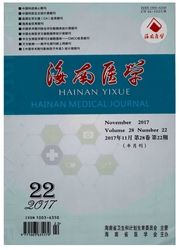

 中文摘要:
中文摘要:
目的 探讨实时定量聚合酶链反应(RQ-PCR)在监测慢性粒细胞白血病(CML)患者微小残留病变、考核疗效以及预测疾病预后方面的应用。方法 应用实时RQ-PCR对84例不同病期患者之间的BCR—ABL转录本水平进行比较,并对5例慢粒患者治疗前后BCR-ABL转录本水平的变化进行监测。结果 加速期和急变期患者的转录本水平明显高于慢性期患者。对于慢性期患者。造血干细胞移植后其BCR—ABL转录本水平明显下降,甚至检测不到,格列卫治疗可获得类似结果。结论 RQ—PcR方法准确可靠,对于监测慢粒患者的微小残留病变、考核疗效以及预测慢粒急变具有重要的临床应用价值。
 英文摘要:
英文摘要:
Objective To investigate the effect of real time quantitative polymerase chain reaction(RQ- PCR) approach in chronic myeloid leukemia (CML) for detecting the minimal residual disease(MRD) or monitoring the treatment response and predicting the prognosis. Methods Sixty-six CML patients, 42 of which were in the in chronic phase, 13 in the accelerated phase, and 11 in the blast crisis phase. Were monitored with BCR-ABL by RQ-PCR. Results The BCR-ABL transcripts level in blast crisis or accelerated phase was significantly higher than that in chronic phase. After allogeneic transplantation of peripheral blood stem cells, those patients BCR-ABL transcript level decreased significantly. Those whom treated with Glivec got the similar results. Conclusions RQ-PCR is reliable and can be used to detect the minimal residual disease, Monitor the treatment outcome, and predicting blast crisis.
 同期刊论文项目
同期刊论文项目
 同项目期刊论文
同项目期刊论文
 期刊信息
期刊信息
